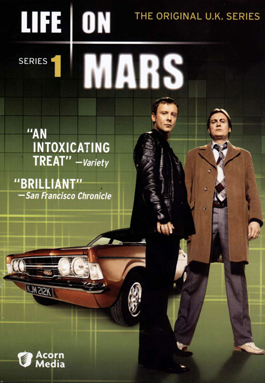home | metro silicon valley index | movies | current reviews | dvd review

Life on Mars
Four discs; Acorn Media; $59.99
By Michael S. Gant
The BBC One series Life on Mars, which started a two-season run in 2006, comes with a great gimmick: A modern Manchester cop named Sam Tyler (John Simm) get slammed by a speeding car; when he wakes up, he finds himself in 1973, 30 years in the past. Unsure if he's hallucinating in a coma, a time traveler or yet one more victim of Occurrence at Owl Creek Bridge syndrome, the cop goes to work for a hard-nosed detective chief inspector, Gene Hunt (Philip Glenister), in his old precinct while trying to sort out his dilemma. Such a good gimmick, in fact, that American TV went for a remake with Jason O'Mara and the original Bad Lieutenant Harvey Keitel (but not good enough; the ABC series wasn't renewed). The BBC One version makes good use of the contrast between then and now, with lots of early-'70s Brit rock on the soundtrack, pointy shoes, boxy tan sedans, creeping sideburns and aggressively spreading collars. Plenty of jokes get cracked when Tyler tries to convince his mates about the wonders of the future to come: databases, cell phones and "multitasking." More seriously, Tyler can't help but insist on some principles of modern policing and suspects' rights—niceties that don't interest the punch-first-ask-questions-later DCI Hunt. Only young copper Annie (Liz White) understands what Tyler is going through. Glenister dominates the show as the cynical, sometimes brutish Hunt, who takes his Clint Eastwood movies a bit too seriously. At times, Hunt's gang of near-rogue cops act out in ways that seem extreme, even for '70s Manchester—it's not Oakland, after all. The familiar cop action—which jams along with staccato editing—is cleverly supported by Tyler's continuing search for a way back to the present, or maybe just consciousness. He is beset by hallucinatory visitations from his TV set and snippets of conversations from the unseen doctors he believes are treating him in 2006. At the same time, he pokes around his old neighborhood, finding younger versions of his troubled parents and almost coming in contact with himself at age 4. A considerable web of associations develops around Tyler's quest in only eight 55-minute episodes, leading up to a first-season finale that answers some question and raises a few more in anticipation of Season Two. Extras in this set include audio commentaries, a making-of documentary and some outtakes.
Send a letter to the editor about this story.
|
|
|
|
|
|